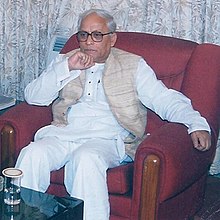Buddhadeb Bhattacharya
Buddhadeb Bhattacharya ( Bengali : বুদ্ধদেব ভট্টাচার্য , Buddhadeb Bhaṭṭācārya ; born March 1, 1944 in Kolkata ) is a politician of the Communist Party of India (Marxist) (CPI (M)). He was Chief Minister of West Bengal from November 6, 2000 to 2011 . He became a member of the Central Committee in 1985 and elected to the Politburo of his party in 2000.
Political career
Bhattacharya studied Bengali literature at the Presidency College in Kolkata. After graduating in 1964, he became a member of the CPI (M) in 1966 and was active in the party's youth organization.
In 1977 he was elected to the West Bengal parliament for the first time (for his constituency at the time, the Kashipur district in Kolkata) and was appointed Minister of Information and Culture in the new left-wing government under the leadership of Jyoti Basu . In the subsequent election he lost his mandate in Kashipur and then joined Jadavpur in 1987 . He was immediately reassigned to the ministerial post.
In the 1990s he resigned after becoming critical of some aspects of his party. After the 1996 election, he was again Minister of Information and Culture and was given parts of the interior department. Jyoti Basu resigned in 2000 after almost 24 years at the helm. Bhattacharya became his successor. He is considered a moderate, efficient politician and was able to unite the various wings of his party behind him.
Bhattacharya's image as an incorruptible “clean man” helped his party to win the election for the sixth time in a row , despite the high sentiment for Mamata Banerjee's Trinamul Congress (TC) . During his time as head of government in West Bengal he stood for a reformed economic policy. Foreign investment and the establishment of new industries in general were encouraged. Part of this industrialization policy was u. a. the planned construction of the Tata Motors car plant in Singur for the construction of the " Tata Nano ". The settlement failed, however, and Tata moved the project to Gujarat, as the right-wing opposition party Trinamul Congress (TC) and the Communist Party of India (Maoist) called for resistance against the settlements and incited parts of the local population to act violent, the Maoists also practiced militants Operations against it.
Bhattacharya's policy is not without controversy within the communist party. a. was criticized that, in acquiring the land necessary for industrialization, some small farmers were disadvantaged. In the parliamentary elections in 2006, the government coalition under his leadership was able to win seats again and now has more than 75 percent of the MPs.
Personal
Bhattacharya has also written poetry ( Chena Phooler Gondho - “The Fragrance Of The Known Flowers”) and for the stage, as well as translating works by Gabriel García Márquez and Wladimir Majakowski into Bengali . He is an admirer of the songs of Rabindranath Thakur ( Rabindra sangit ) and a fan of cricket.
He and his wife Meera have a daughter named Suchetana.
Web links
| personal data | |
|---|---|
| SURNAME | Bhattacharya, Buddhadeb |
| BRIEF DESCRIPTION | West Bengali politician of the Communist Party of India (Marxist) (CPI (M)) |
| DATE OF BIRTH | March 1, 1944 |
| PLACE OF BIRTH | Kolkata |
